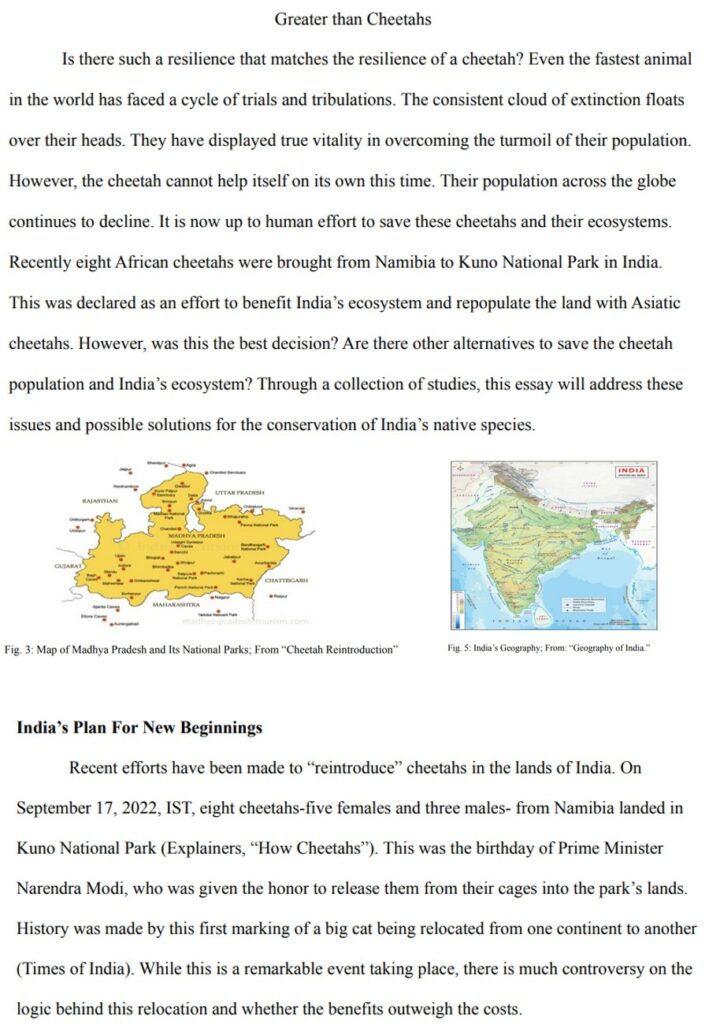
Wildlife Biology Research
Aashvi is an 11th grade student from Madison Academic Magnet High School. She is interested to work on a Wildlife Biology research project.
Aashvi is interested in biology and how the environment impacts animals and their behavior, especially with endangered species.
Scope of the program
Program Overall Structure
Aashvi completed a conservation biology paper on cheetahs. In the initial weeks, Aashvi investigated
potential topics, refining the project scope and outlining the key points of information to be included in
the final paper. Over the course of eight meetings, Aashvi prepared outlines and drafted sections of the
paper in advance, which were discussed and revised during the meetings. Aashvi followed up on each
meeting with a summary outline of the plan and goals for the next meeting. The final paper was drafted
and reviewed in the final weeks.
Learning Objectives
The primary goals and objectives were to develop research skills to construct an annotated
bibliography, outline paper topics, and write a research paper on African and Asiatic cheetahs
discussing conservation, relocation and repopulation efforts. As the research progressed, Aashvi
identified issues with relocation efforts to place a non-native cheetah in Asia and further investigated
some of the political motives for proceeding with a relocation effort that conservation biologist
experts critiqued.
What challenges did she face?
- There were some initial challenges with finding reliable sources, and Aashvi was able to find more library support and was eventually able to compile an impressive bibliography.
How did our program help her?
- Aashvi researched on African and Asiatic cheetahs conservation efforts and the research paper she worked on has motivated her to pursue her major in wildlife biology and conservation.
- The mentorship program provided Aashvi the chance to develop research skills to construct an annotated bibliography, outline paper topics, and write a research paper.
Wildlife Biology research mentorship overview
“I completed a research paper centered on the recent news about the relocation of African cheetahs to Kuno National Park in India. I included the benefits and possible consequences of this relocation. I further investigated political motives such as Hindu nationalism, which promoted this relocation effort that many conservation biologists critiqued.
Throughout this research, I educated myself about many anthropogenic threats that drastically
declined the cheetah population throughout history. My mentor is a senior lecturer in Environment and Society at Brown University. He is an expert on the effect of urbanization and industrialization. Although one may assume these studies contrast with my interest in wildlife, we came together to discover the close relationship between human activity and animal habitats.My mentor is wonderful. He taught me life lessons that I will use throughout college and my future career. I learned invaluable information from completing this research paper. As I composed the elements of this paper, I formed the elements of my identity. I was inspired to follow my passion for protecting wildlife. This research paper motivated me to pursue my major in wildlife biology and conservation.”
Aashvi Baker
Matched professor in wildlife biology research:
The mentor is a Senior Lecturer in Environmental Studies. He teaches courses and advises students on sustainable design, environmental stewardship, urban infrastructure, and transportation technology and policy. He has been involved in research, design, and construction of high performance educational facilities for over 25 years.
“Aashvi exceeded my expectations. The organization, communication, and written work were all consistently at a high level. It has been a pleasure to work with Aashvi and I look forward to learning about her progress in the future.“
Lecturer from Brown University
Excerpts from the student’s work
Aashvi’ final research paper on “Greater than Cheetahs”, which is about the relocation of African cheetahs to Kuno National Park in India.



